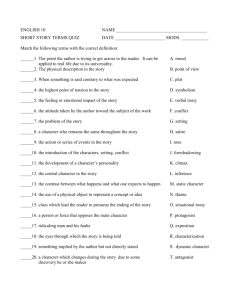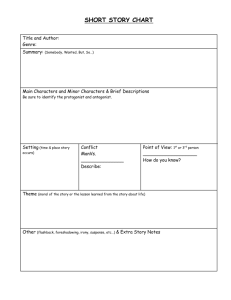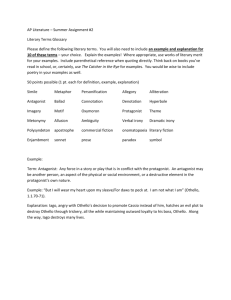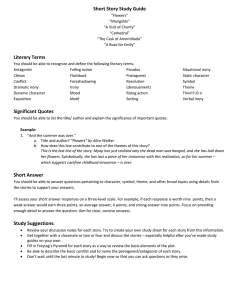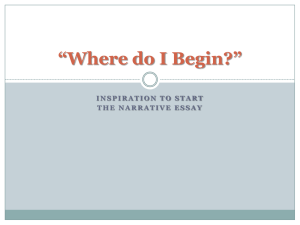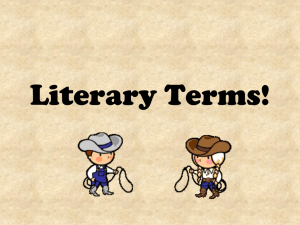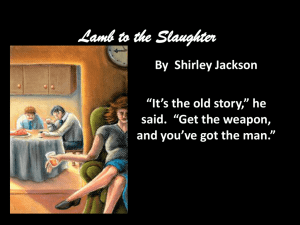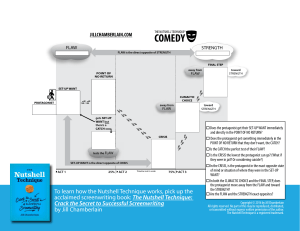Literary Terms Notes
advertisement
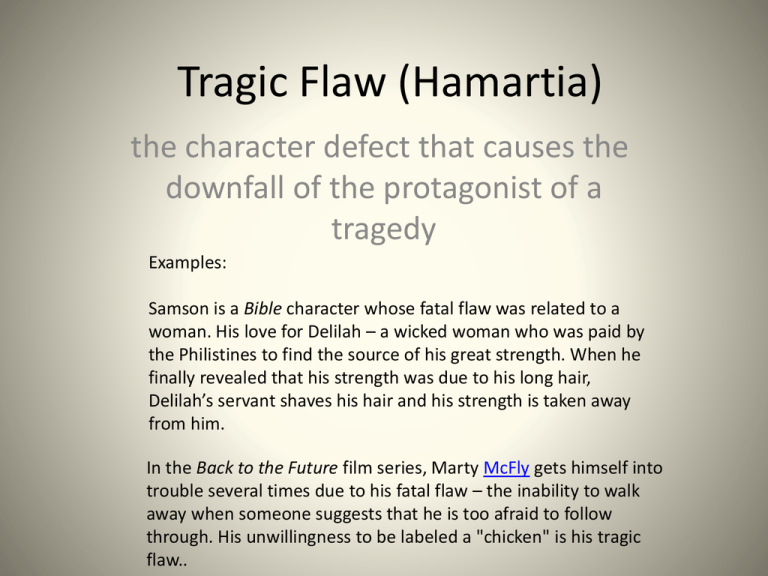
Tragic Flaw (Hamartia) the character defect that causes the downfall of the protagonist of a tragedy Examples: Samson is a Bible character whose fatal flaw was related to a woman. His love for Delilah – a wicked woman who was paid by the Philistines to find the source of his great strength. When he finally revealed that his strength was due to his long hair, Delilah’s servant shaves his hair and his strength is taken away from him. In the Back to the Future film series, Marty McFly gets himself into trouble several times due to his fatal flaw – the inability to walk away when someone suggests that he is too afraid to follow through. His unwillingness to be labeled a "chicken" is his tragic flaw.. Tragedy A dramatic presentation that arouses pity and fear in the audience, thus stimulating a catharsis (or release)of these emotions. . Example: In Shakespeare’s Othello , Othello allows himself to be convinced that his wife is cheating on him. Othello then murders his own wife, who is completely faithful and trustworthy. Archaic words Old fashioned language which is no longer commonly used. Examples: thee, thou, wherefore, art (instead of “are”) Wherefore art thou such a saucy scoundrel? Hyperbole A figure of speech consisting of exaggeration or extravagance of statement deliberately used for effect and not meant to be taken literally. Example Situational Irony Irony involving a situation in which actions have an effect that is opposite from what was intened, so that the outcome is contrary to what was expected. Example Verbal Irony irony in which a person says or writes one thing and means another, or uses words to convey a meaning that is the opposite of the literal meaning. Example Dramatic Irony Information or knowledge is known by the audience but not grasped by the characters in the play. Example Soliloquy passage in a drama in which a character expresses his thoughts or feelings aloud while alone upon the stage Examples: Jean Valjean in Les Miserables sings his thoughts, allowing the audience to get inside of his mind and fully understand who he is and what he is going through. Protagonist the character of a play or story who drives the action. In Julius Caesar, the protagonist shifts throughout the play. Antagonist the character who is keeping the protagonist from reaching his or her goal Aside a character's dialogue is spoken but not heard by the other actors on the stage. Asides are useful for giving the audience special information about the other characters onstage or the action of the plot. Examples: In Saved by the Bell, Zach Morris has the ability to call timeout, and gives the audience small pieces of information, all while the other members of the show cannot hear what he says. Monologue a single speaker goes on and on and on, speaking to the other characters on stage, the audience, whomever. (All soliloquies are monologues, but not all monologues are soliloquies) Example: In Gladiator, Maximus talks for over a minute straight without interruption while he tells the Emperor who he truly is. Tone/Mood The attitude a writer takes toward the reader, a subject, or a character. Tone is conveyed through the writer’s choice of words and details, and the tone a character conveys can create the mood that the author wants the reader to feel. Example: Dwight’s serious tone in The Office creates a humorous mood Conflict Struggle or clash between opposing characters, forces, or emotions. Conflict can be external or internal. example of external conflict: Example of internal conflict: Anachronism Anachronisms happen when something in your book is out of sync with time. In other words, anachronisms are references that are out of place given the text's chronology, sequence of events, or historical setting. Examples: In Back to the Future, Marty Mc Fly plays a Gibson guitar, which didn’t exist yet. Blank Verse (unrhymed iambic pentameter) Unrhymed verse in which each line contains five iambs; an iamb is a type of metrical foot that consists of an unstressed syllable followed by a stressed syllable.
